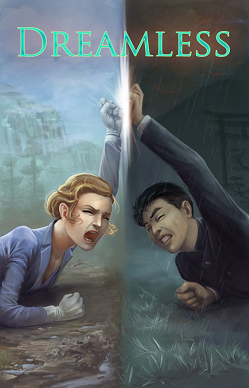
Elanor has a secret, one that she's carried with her throughout her life. When she sleeps, she doesn't dream. Instead, she sees scenes from the life of a boy named Takashi. She's not channeling a past life: he's real, he's alive in Japan, he was born on the same day she was. They know everything there is to know about each other, they speak each other's languages, and before too many years have passed they are desperately in love.
The problem? It's hard for under-18s to emigrate across the Pacific. ...Especially in the 1940s, when Japan and America are on the brink of war.
Can be found here.![]() Illustrated in gorgeous pastels by Sarah Ellerton. Written by Bobby Crosby. A backup can be found here
Illustrated in gorgeous pastels by Sarah Ellerton. Written by Bobby Crosby. A backup can be found here![]() .
.
This webcomic provides examples of:
- And I Must Scream: When Elanor and Takashi are asleep at the same time, she can only see blackness and hear the ambient noise as he lies in bed. She finds it so horrifying that she alters her entire sleep cycle so they'll never be asleep at the same time.
- Blessed with Suck: The main two's condition is probably one of these, though it varies as to which they see it as themselves.
- Catapult Nightmare: Elanor wakes up like this
 ◊ after a bad dream.
◊ after a bad dream. - Cherry Blossoms: Takashi walks by a cherry tree here
 .
. - Dream Spying: The whole point of the comic.
- Dissonant Serenity: The couple doesn't care about the horrors of war unfolding around them
 ◊.
◊. - Driven to Suicide: Elanor's mother kills herself due to her mental illness. Elanor herself very nearly throws herself off the same bridge as her mother.
- Flashback: Due to the use of How We Got Here.
- Girl of My Dreams: The main characters (who live on opposite sides of the world, so one is asleep while the other one is awake) share each other's waking lives in their dreams.
- Great Offscreen War: World War II, amazingly enough. Elanor is too shut inside herself to notice anything going on around her, to the point that the only time the war actually affects the plot is when it allows Takashi to get to America.
- Hero of Another Story: Takashi. The story follows Elanor's viewpoint for most of the story, where she mostly deals with her mental illness and her alcoholic father. Takashi, meanwhile, has an active social life, deals with cultural expectations like arranged marriages and the upcoming war, and the natural emotional struggles that come with those things. It's lead some fans to think that Takashi's story is far more interesting than Elanor's.
- Hooker with a Heart of Gold: Takashi's friends hire him a prostitute for his eighteenth birthday. He is not amused, but later she becomes his confidant. (Who else is he gonna talk to about it?)
- It Always Rains at Funerals: It rains at the mother's funeral
 .
. - Love Before First Sight: Living each other's lives, Takashi and Elanor fall in love even before having met each other.
- Mindlink Mates:
- Central conceit of the story. Elanor and Takashi can only block each other out when they're sleeping at the same time. Being in different timezones this can get a bit difficult to coordinate. They've shared consciousness since they were babies so they can speak multiple languages and get twice the experience.
- Her father can speak German for similar reasons.
- Missing Mom: Elanor's mother committed suicide from jumping off a bridge because of her schizophrenia.
- Precious Photo: The General is looking at a photograph of his wife
 .
. - Sean Connery Is About to Shoot You: Here
 .
. - Sibling Incest: Not literal, of course, but Eleanor and Takashi's relationship can feel a lot like this to anyone who's ever heard of the Westermarck Effect.
- Single-Target Sexuality: One can only assume.
- Star-Crossed Lovers: An American girl and a Japanese boy... during World War II. Subverted toward the end.
- The Unreveal: What causes the mind-link and why? No one ever knows.
- Wham Line: "You can speak Japanese for the same reason I can speak German."

- "What Now?" Ending: A rare non-depressing example.
